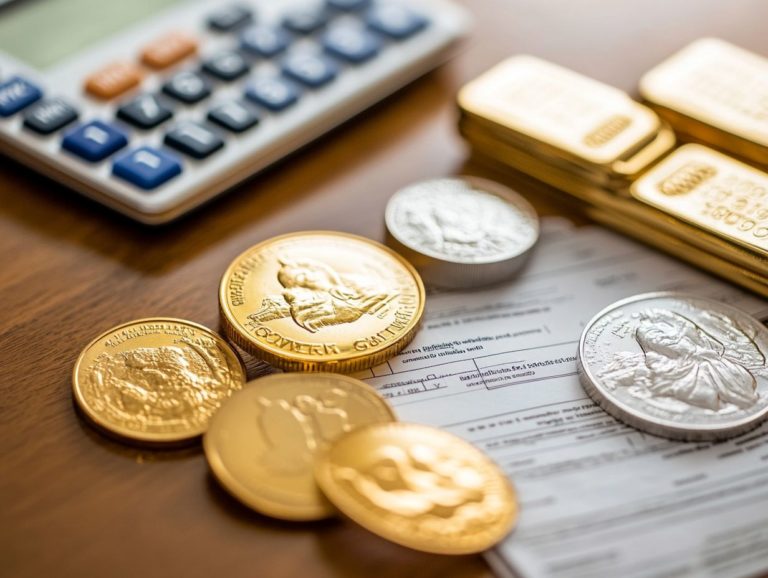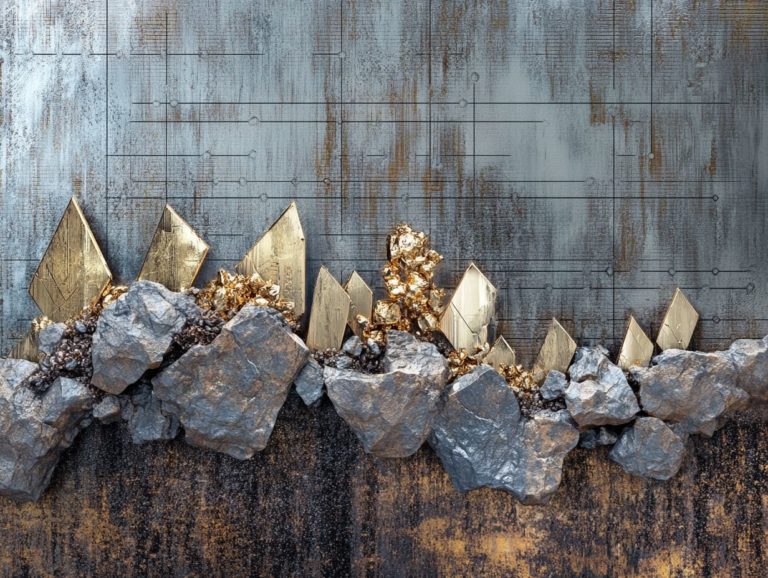Tax Implications of Precious Metals in Charitable Giving
When it comes to charitable giving, precious metals like gold, silver, and platinum offer unique advantages that extend far beyond their intrinsic value.
This piece delves into what precious metals are and presents compelling reasons for donating them, particularly emphasizing the tax benefits that often accompany such acts of generosity.
You can explore potential charitable tax deductions and capital gains tax exemptions, guiding you through the process of donating precious metals. This includes tips on selecting a charity and understanding the significance of proper valuation.
Moreover, it’s essential to be aware of certain pitfalls and considerations, ensuring your philanthropic efforts align with IRS regulations and support your long-term financial goals.
Contents
- Key Takeaways:
- Tax Benefits of Donating Precious Metals
- How to Donate Precious Metals
- Potential Pitfalls and Considerations
- Frequently Asked Questions
- What are the tax implications of donating precious metals to a charity?
- Are there any limitations on the amount I can deduct for donating precious metals to a charity?
- Do I need to get an appraisal for my donated precious metals?
- Can I donate precious metals from my Individual Retirement Account (IRA) to a charity?
- What happens to my tax deduction if I donate precious metals to a charity but they are not sold by the charity?
- Are there any special reporting requirements for donating precious metals to a charity?
Key Takeaways:
- Donating precious metals to charity can provide significant tax benefits, including tax deductions for donations and exemptions from capital gains tax.
- Choosing a reputable charity and properly valuing and documenting the donation is crucial to ensure compliance with IRS regulations.
- Consider the potential impact on estate planning and inheritance when donating precious metals, along with any reporting requirements set by the IRS.
Discover the Value of Precious Metals!
Precious metals like gold, silver, and platinum are not just shiny commodities; they re highly esteemed in the investment and jewelry markets for their intrinsic value and remarkable ability to hold worth over time.
You might find these metals to be a reliable hedge against inflation and economic turmoil, making them a savvy choice for diversifying your investment portfolio.
Their tangible nature means you can actually own physical gold, silver, or platinum, whether in the form of bullion, coins, or exquisite jewelry, offering you both aesthetic pleasure and financial security.
Many investors gravitate towards gold bullion and silver, not just for their current market value but also for their rich historical significance as currencies and stores of wealth spanning thousands of years.
While platinum may be less common, it commands a premium price due to its rarity and valuable applications in various industries, such as automotive catalysts and electronics.
The trend of donating jewelry is also gaining momentum. People are contributing their valuable pieces to charities, creating benefits that ripple through both personal lives and society as a whole.
The diverse applications of these precious metals highlight their lasting importance across various sectors, ensuring their relevance in both contemporary markets and historical narratives.
Why Donate Precious Metals?
Donating precious metals, like gold coins or jewelry, offers you a remarkable opportunity to support charitable causes while potentially reaping tax benefits.
When you donate these valuable items, you often qualify for a charitable deduction, which not only aids the recipient organization but also enables you to contribute to meaningful initiatives that resonate with your values.
Giving generously not only helps those in need it can also enhance your financial strategy by allowing you to sidestep certain taxes linked to capital gains.
Many individuals discover that such acts of generosity yield a profound emotional reward, knowing their contributions genuinely impact lives and communities.
By supporting a cause that speaks to you, you have the power to create a legacy that extends beyond your lifetime. Moreover, these donations can effectively reduce your taxable income and potentially lower your IRS tax rates.
Ultimately, donating precious metals can be a savvy financial move that satisfies your philanthropic ambitions, seamlessly blending financial advantages with heartfelt altruism.
Tax Benefits of Donating Precious Metals
Understanding the tax benefits of donating precious metals is essential for anyone looking to maximize the financial advantages of charitable contributions.
When you donate gold, silver, or other precious metals, you have the potential to receive substantial tax deductions on your income taxes, effectively lowering your taxable income.
You can often deduct the market value of the donated items, allowing you to sidestep the capital gains tax (the tax applied to the profit from the sale of an asset) that would apply if you sold those assets.
This creates an opportunity for savvy donors like you to employ loss carry forward strategies, ensuring that your charitable actions deliver optimal financial rewards.
Consider how you can make a difference today!
Charitable Tax Deductions
Charitable tax deductions present a compelling incentive for you to donate precious metals. They offer a direct reduction in your taxable income when documented correctly. If you’re considering donating items like gold coins or gold bullion, it’s crucial to adhere to IRS regulations. Complete Form 8283, which is specifically used for non-cash charitable contributions that exceed a certain value.
This form acts as verification of your donation and details the appraisal process necessary to establish the fair market value of your donated assets. This allows you to maximize your charitable deduction effectively.
It’s vital to keep detailed records, including receipts and, if needed, detailed appraisals from qualified professionals. For instance, if you choose to donate silver bars or platinum coins, ensure that the appraisal reflects current market rates to comply with IRS guidelines.
The IRS typically mandates that donations valued over $5,000 be appraised by a qualified appraiser to substantiate your claimed deduction.
This careful approach increases your chances of getting a successful deduction and underscores the importance of transparency in charitable giving.
Capital Gains Tax Exemptions
Capital gains tax exemptions for donated precious metals present a valuable opportunity for you to sidestep taxation on appreciated assets. When you donate gold, silver, or other precious metals, you aren t liable for the capital gains tax that would typically apply if you sold those assets for a profit.
The IRS permits this exemption to encourage charitable giving. This allows you to benefit from loss carry forward provisions and enhance your wealth accumulation through strategic contributions.
It’s crucial for you to understand how these exemptions are applied differently across various types of metals. For example, the market values of gold and silver can fluctuate, which may impact your potential deductions. Therefore, it’s wise to consult the IRS guidelines on fair market value and consider the tax implications of selling precious metals to a dealer to ensure your reporting is accurate.
Planning your donation strategy can help you maximize benefits. Consider donating metal items that you ve held for a significant duration, as this approach can provide even further tax advantages.
Familiarizing yourself with relevant IRS regulations, such as IRS Publication 526, will give you insight into allowable deductions and proper valuation methods. This knowledge will enable you to navigate the donation process effectively and make well-informed decisions.
How to Donate Precious Metals
Donating precious metals, such as gold bullion or jewelry, requires careful consideration to ensure that your contribution is both meaningful and compliant with tax regulations. Start by selecting a reputable charity that resonates with your values and accepts precious metal donations.
After finding the right organization, it s essential to conduct a proper valuation to ascertain the fair market value of your donation. This figure will play a significant role in your charitable deduction. Meticulously documenting this process is not just prudent for tax purposes but also provides you with peace of mind regarding your generous gift.
Choosing a Charity
Choosing the right charity to donate your precious metals, like gold, is a vital step that can amplify both the impact of your contribution and the tax benefits you enjoy. Verify that the organization is registered as a 501(c)(3) nonprofit. This registration allows you to claim charitable deductions on your tax filings with the IRS.
By thoroughly researching your options, you can ensure that your values align with the mission of the organization, making your donation genuinely meaningful. Have you thought about the impact your donation could make?
As you explore your choices, consider important factors such as the charity s transparency regarding financial practices and how effectively it utilizes donations. Seek out organizations that openly share their annual reports and provide a clear breakdown of how funds are allocated.
Make sure the charity s mission resonates with your philanthropic goals. This alignment enhances the fulfillment of your contribution and fosters ongoing support. Staying compliant with IRS regulations is crucial, as it impacts the tax benefits you may receive.
Investing time in due diligence can help you steer clear of pitfalls and enable you to contribute in a manner that truly reflects your values.
Start your meaningful journey today!
Proper Valuation and Documentation
Proper valuation and documentation of donated precious metals are essential for ensuring compliance with IRS regulations. This maximizes the advantages of your charitable contribution.
To achieve an accurate assessment, it often makes sense to obtain an independent appraisal an expert evaluation of value from a qualified appraiser. They can authenticate the item’s value based on current market conditions, providing you with peace of mind.
Beyond the necessary Form 8282, which charities use to report sales of donated items, be aware of Form 8283. This form documents noncash charitable contributions (items like metals that aren t cash) exceeding $500 and serves as vital evidence to substantiate the donation you claim on your tax return.
Thorough preparation for potential IRS audits is crucial. Keeping detailed records of appraisals and receipts will bolster your defense of the claimed deductions.
Meticulously filing these documents not only satisfies regulatory requirements but also enhances the integrity of the donation process. This ensures that the charitable organization receives the full benefit intended.
Potential Pitfalls and Considerations
Understanding the potential pitfalls and considerations when donating precious metals is crucial for ensuring a smooth and rewarding experience. Be aware of IRS regulations it s vital for your financial success!
Also, consider the collectibles tax on specific types of precious metals and the implications of market value fluctuations. Keeping these factors in mind will help you avoid unexpected consequences along the way.
IRS Regulations and Reporting Requirements
Understanding IRS regulations and reporting requirements is crucial if you’re considering donating precious metals. Compliance safeguards your tax benefits and ensures your contributions are recognized.
When you donate assets valued above a certain threshold, you must complete Form 1099-B to report the transaction accurately. Knowing about the collectibles tax is equally important as it influences how much of your donation qualifies for a charitable deduction.
Navigating these regulations can feel overwhelming, yet they significantly impact your decisions as a donor. The IRS mandates an appraisal of donated precious metals to substantiate their value, but this might make you hesitant due to potential costs. Understanding gold’s tax implications is essential, and consistently adhering to proper documentation can streamline the donation process and enhance your willingness to give.
Understanding Form 8283 and its stipulations on non-cash gifts is essential. This ensures that you maximize the benefits of your charitable contributions while staying aligned with IRS standards.
Impact on Estate Planning and Inheritance
The impact of donating precious metals on your estate planning and inheritance is crucial and can significantly shape your financial strategies.
These donations not only affect the total market value of your estate but also dictate how wealth is distributed among your heirs. When you choose to donate these valuable assets, it can lead to reduced tax liabilities, preserving more of your estate s wealth for future generations.
Furthermore, understanding how the relative worth of donations like gold bars or coins interacts with fluctuations in gold mining stock values adds an intricate layer to your decision-making process. As market changes can greatly influence both the immediate financial implications and the long-term benefits for your heirs, it’s also crucial to consider the tax implications of selling silver investments in your planning.
Frequently Asked Questions
What are the tax implications of donating precious metals to a charity?
The tax implications depend on the value of the metals and the type of charity you are donating to. Generally, if the metals are considered capital assets and have appreciated since you acquired them, you can receive a tax deduction for the full fair market value of the metals at the time of donation.
If you have further questions or need clarification, feel free to reach out for more information!
Are there any limitations on the amount I can deduct for donating precious metals to a charity?
Yes, your tax deduction for donating precious metals is limited to a percentage of your total income after deductions. This percentage varies based on the type of charity and your tax situation.
Make sure to chat with a tax pro to get personalized advice!
Do I need to get an appraisal for my donated precious metals?
Yes, if the value of your donated precious metals exceeds $5,000, the IRS requires an appraisal.
You need a qualified appraiser to complete the appraisal, which should include a description of the metals, their value, and how that value was determined.
Can I donate precious metals from my Individual Retirement Account (IRA) to a charity?
Yes, you can donate precious metals from your IRA through a qualified charitable distribution (QCD). This allows you to donate directly from your IRA without tax penalties, up to $100,000 per year.
What happens to my tax deduction if I donate precious metals to a charity but they are not sold by the charity?
If the charity keeps the donated precious metals and does not sell them, you can still claim a tax deduction for the full fair market value at the time of donation.
However, if the charity sells the metals, you must report any capital gains on your tax return.
Are there any special reporting requirements for donating precious metals to a charity?
Yes, you must report any donations of precious metals on your tax return using Form 8283, Noncash Charitable Contributions.
This form needs to be filed with your tax return if your total noncash donations exceed $500.














